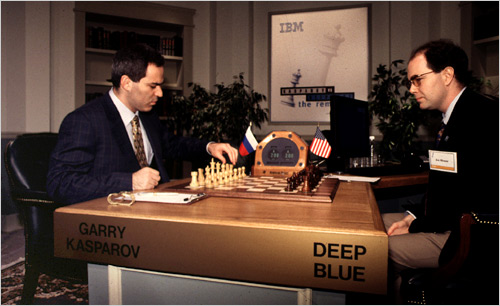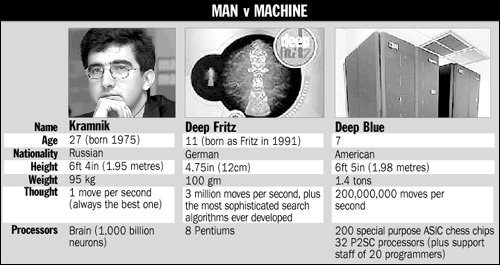|
However, even if Kasparov had been victorious (as he was in the first two matches), would that have changed the notion that computers/computer programs have somehow caught up? Probably not. There have been a series of recent matches pitting computers against humans… computers have recently dominated. What do these matches really mean? To some, there is a deep scientific intrigue… to others, it is perhaps overemphasized.
To put this in prospective, one may recall a comment made by Deep Blue-Kasparov match commentator GM Maurice Ashley in a 1997 National Public Radio (NPR) interview shortly after the match. When asked about the result, GM Ashley replied, "So what. Soooo what. If we build a robot that can outdunk Michael Jordan, is that really what we want to see?" Ashley went on to talk about the inherent beauty in chess competition which combines intense skill, grit and determination, body language and emotion (even human imperfection) … all in the heat of battle. "That's what we play chess for," says GM Ashley adding on the point with emphasis. Despite this incisive point, there seems to be (and perhaps always will be) a bit of mystery to man vs. machine battles.
In a few days, Kramnik will attempt to repeat Kasparov's success of the first two matches, most notably the masterful technique Kasparov displayed in the 6th game of the 1996 match. Kramnik, who has been known to put the squeeze on quite a few opponents, will square off against Deep Fritz in the highly-anticipated match beginning October 4th. He discussed his approach in at interview in Der Spiegel magazine:
"I have to change my way of playing from normal chess. What matters is to develop the most unusual tactics possible. I have to keep the computer from using its calculating skills. And I will do this while provoking moves that it doesn't understand. The machine has to feel uncomfortable, so to speak.
Computers are just street muggers. The love to grab pieces whenever there is a chance to do so. I wouldn't have the slightest chance in a fast game. A computer isn't capable, in the same way a human is, to put knowledge into context. Intuition is a gift that is totally foreign to a machine and where problems can arise for it. Sometimes I just have a gut feeling which move I must make. I just feel it - and my feelings have rarely let me down."
|
|

